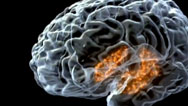The Sleep-Memory Connection
- By Melissa Salpietra and Susan K. Lewis
- Posted 07.01.07
- NOVA scienceNOW
What happens in your brain as you cycle through the various stages of sleep, and how does this activity affect learning and memory? See what scientists are learning about REM (rapid-eye movement) sleep and other phases, and explore recent research linking sleep—and sleep deprivation—to different types of memories.
 Launch Interactive
Launch Interactive
Explore the stages of a good night's sleep and the research linking sleep to memory.
Credits
Images
- (sleeping girl)
- © Dan Lepp/Etsa/CORBIS
- (brain waves)
- adapted from image © 1995 Jaakkoo Malmivuo & Robert Plonsey / Bioelectromagnetism
- (brain)
- © www.istockphoto.com/Stephen Kirklys
- (coffee)
- © istockphoto.com/Brian Wilke
- (PET scans)
- adapted by permission from MacMillan Publishers Ltd: Nature Neuroscience/Maquet, P., et al. (2000). "Experience-Dependent Changes in Cerebral Activation During Human REM Sleep." Nature Neuroscience 3, 831-836. © 2000
- (eye)
- © istockphoto.com/Charles Gouin/Gouin Photography
- (fingers on keyboard)
- © istockphoto.com/Liv Friis-Larsen
- (word pairs)
- © NOVA/WGBH Educational Foundation
- (maze)
- © istockphoto.com/Johan van Vaerenbergh
Related Links
-

Sleep
Why do we need sleep? Part of the answer may be to strengthen memories.
-

Sleep: Expert Q&A
Matt Walker of Harvard Medical School answers questions on how sleep impacts our ability to learn.
-

How Memory Works
Neurobiologists are honing in on how memories form, and then finding ways to erase them.
-

Sleepless Surgeons
How important is sleep to a surgeon's performance? Neil deGrasse Tyson visits a Harvard sleep researcher to find out.
You need the Flash Player plug-in to view this content.



